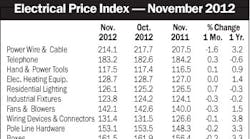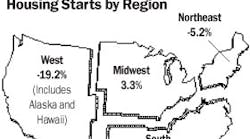Latest from Mag
People - Dec 21, 2012
Obituaries - Dec 21, 2012
November EPI Index Shows No Change
Housing Starts Dip 4% in November
Electrical Marketing - December 21, 2012
Around the Industry - Dec 21, 2012
A growing number of Northeast electrical distributors are offering fluorescent lamp recycling services to their customers.
Over the past two years, nearly 50 New England distributors, including branches of Granite City Electric Supply Co., Quincy, Mass.; Electrical Wholesalers Inc., Hartford, Conn.; Consolidated Electrical Distributors Inc., Westlake Village, Calif.; W.W. Grainger Inc., Lake Forest, Ill.; and WESCO Distribution, Pittsburgh, have joined with licensed hazardous waste facilities to provide their customers with convenient recycling opportunities. The distributors’ programs range from selling pre-paid mailing boxes that customers send directly to a lamp recycler, to complete customer service that includes the pickup of spent lamps.
“Encouraging our customers to recycle mercury-containing lamps and providing a simple solution to accomplish this is the right thing to do for the environment and customer service,” said Jim Baines, account representative for WESCO-Bangor. Baines launched a recycling program at WESCO’s Bangor branch after Maine began requiring all mercury-containing lamps to be recycled or handled as hazardous waste in July 2002. Additional WESCO branches in Biddeford, Portland and Rockland now offer the program in Maine. Using the same trucks that deliver products to its customers, WESCO picks up spent lamps and stores them at its facility until the recycler collects them.
WESCO has also sold the Philips Lighting’s Alto line of low-mercury lamps for some time. At press time, Baines was in Portland, Maine, training people on Universal Waste handling, a three-year certification program. Baines said he is one of the only people in Maine who offers this training. “That has been a big plus for our business as well. We do charge for that and we make margin on that.”
Lamp manufacturers also are actively promoting lamp recycling. Paul Walitsky, manager, sustainability, Philips Lighting, Somerset, N.J., said his company encourages its distributors to work with recyclers. He said some distributors sell a prepaid box and the customer fills it up and then sends it back to the recycler by UPS. Other distributors offer complete customer service, including the pickup of spent lamps. Walitsky said WESCO’s Baines spoke about WESCO’s recycling program in Maine last year at Philips’ distributor council meeting at the company’s headquarters.
“In some cases the distributor will introduce the recycler to the end-user. In some cases they are partners. In cases like WESCO, they take the lamps back to their place, and then the recycler only has to go to the distributor. He doesn’t have to go to all the end-users. So it makes it more efficient from an environmental and cost standpoint,” said Walitsky.
At times, customers initiate the conversation about lamp recycling. Greg Smith, regional manager-North for Granite City Electric Supply, got into the recycling business in 1996 when some of his more environmentally conscious customers began asking for the service. As one of the first electrical distributors to offer recycling, he saw it as a way to create a niche in the market. Smith says he makes a “reasonable average profit margin” from his program but stresses that the real benefit of the program is “receiving orders for lamps that we wouldn’t have if we didn’t recycle.”
Like WESCO, Granite City provides full customer service, selling fiber drums for lamp storage and picking them up when full. Its business partner, Northeast Lamp Recycling, collects the spent lamps from Granite City’s locations about every two months. Granite City offers the service at its branch locations in Vermont and New Hampshire, formally JG Temple, but plans to extend the program to all 18 branches in the Northeast over the next year.
Under the Environmental Protection Agency’s Universal Waste Rule, businesses must manage used mercury-containing lamps, including fluorescent, high-intensity discharge (HID) and mercury-vapor lamps, as hazardous wastes. All of the Northeastern states have adopted EPA’s Universal Waste Rule and some have passed even more stringent laws.

